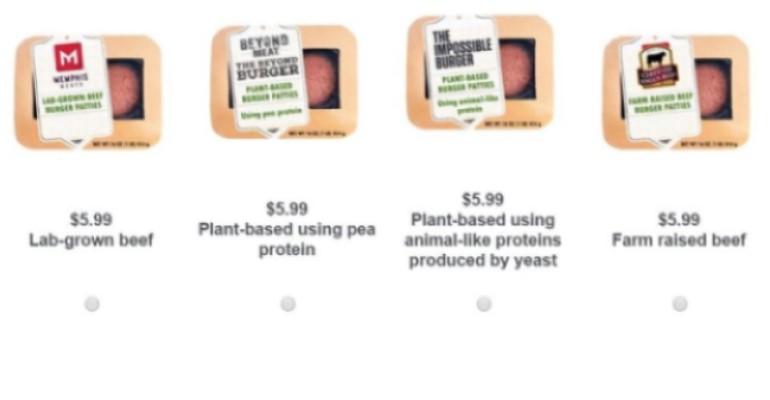Consumers still prefer beef over alternatives
Research looks at consumer acceptance, choice and willingness to pay for beef burger alternatives.

Despite rising interest in innovative non-animal-based protein sources, consumers still prefer traditionally raised ground beef, according to new research.
While there was more than 20% growth in the plant-based meat category in 2018, according to the Plant Based Foods Assn., there is still a great deal of uncertainty about consumers’ preferences for these alternative products and ample speculation about the ultimate size of this market.
One popular veggie burger patty is made with plant-based protein (pea protein) and beet juice, resulting in a burger that "bleeds" like a traditional beef burger (Beyond Burger). Another new type of burger uses plant-based heme as the key ingredient to create a meaty flavor and appearance (Impossible Burger).
For lab-grown meat, the stem cells of a living cow are harvested and nurtured to create muscle tissue in the lab. Lab-grown meat is not yet available to consumers because the technology remains cost prohibitive, but it is expected to become available in the coming years.
Beyond the challenge of the technical feasibility to successfully produce large quantities of affordable lab-grown meat, another major challenge is consumer acceptance of the novel products. Whether these burgers will become successful on the market depends on whether consumers will adopt lab-grown or new plant-based burgers in their diet.
Purdue University head of agricultural economics Jayson Lusk, along with assistant professor at Wageningen University Ellen Van Loo and Michigan State University agricultural economist Vincenzina Caputo, surveyed about 1,800 U.S. food consumers earlier this year and asked them to make a number of simulated shopping choices.
In each choice, consumers had five options: They could buy conventional farm-raised beef, a plant-based burger made with pea protein (i.e., Beyond Meat), a plant-based burger made with animal-like protein (i.e., Impossible Foods) or lab-grown meat (i.e., Memphis Meats), or they could choose not to buy any of the products (i.e., “none”).
Results from mixed logit models showed that, holding prices constant and conditional on choosing a food product, 72% of participants chose farm-raised beef, 16% chose a plant-based (pea protein) meat alternative, 7% chose a plant-based (animal-like protein) meat alternative and 5% chose lab-grown meat. Adding brand names (Certified Angus Beef, Beyond Meat, Impossible Foods and Memphis Meats) actually increased the share choosing farm-raised beef to 80%.
At present, the future market potential of beef alternative products appears to fit more in the “niche” category, even at significant price discounts. The research found that even if plant- and lab-based alternatives experienced significant (e.g., 50%) price reductions, farm-raised beef maintained a market share majority.
Environment and technology information had minor effects on conditional market shares but reduced the share of people not buying any meat (alternative) options, indicating that information pulled more people into the market.
“These findings suggest that increasing concerns about environment or animal welfare benefits, rather than damaging conventional meat demand, might [instead] pull more consumers into the market for plant- and lab-based alternatives,” the report noted.
Vegetarians, males and younger, more highly educated individuals tended to have relatively stronger preferences for the plant- and lab-based alternatives relative to farm-raised beef.
Respondents were strongly opposed to taxing conventional beef.
In addressing the question of how these new products should be labeled, the study found that respondents were strongly opposed to allowing plant- and lab-based alternatives to use the label “beef.” In addition, most consumers would support a policy that requires that any product labeled as “beef” must come from cattle that have been born, raised and harvested in the traditional manner, rather than coming from alternative sources such as a synthetic product from plant, insects or other non-animal components and any product grown in labs from animal cells.
“With more plant-based alternatives coming to market and consumers becoming more familiar with these products and with the respective brands, it remains interesting to see whether the demand for these products change as more alternatives become available at the foodservice and retail level and consumers become more familiar with the alternatives to conventional beef,” the report concluded.
About the Author(s)
You May Also Like





